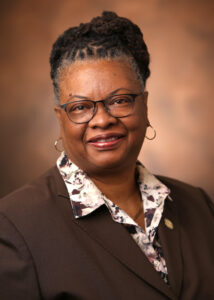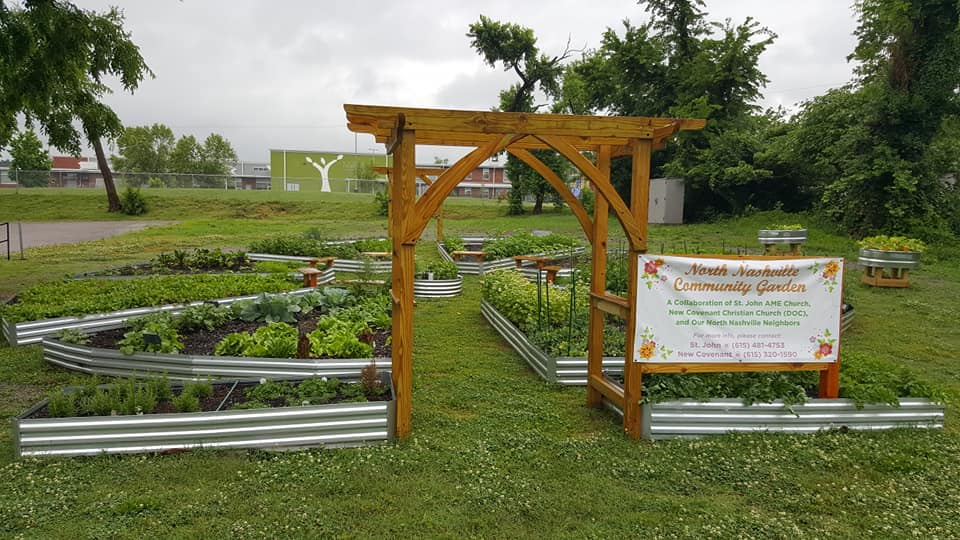Public theology fellow leaves legacy of community building and support
 The Rev. Teresa L. Smallwood, who helped launch Vanderbilt’s Public Theology and Racial Justice Collaborative as associate director in 2017, is moving to Pennsylvania’s United Lutheran Seminary in January.
The Rev. Teresa L. Smallwood, who helped launch Vanderbilt’s Public Theology and Racial Justice Collaborative as associate director in 2017, is moving to Pennsylvania’s United Lutheran Seminary in January.
Over Smallwood’s four years at Vanderbilt Divinity School, the Collaborative has hosted nearly 30 workshops and more than 20 fellows and scholars to advance racial justice in areas ranging from medical apartheid to food equity.
Prior to finding a second career in academia, Smallwood practiced law and served as an assistant district attorney in her home state of North Carolina for nearly 20 years. She then earned a master’s in divinity from Howard University and a doctorate from Chicago Theological Seminary. “We started with 10 basic laws in the Commandments, so it’s a natural pivot,” she said.
“We started with 10 basic laws in the Commandments, so it’s a natural pivot.” -Teresa Smallwood
The co-curricular Public Theology and Racial Justice Collaborative was funded by a $1 million grant from the Henry Luce Foundation and focuses on engaging with society in building a common public life and improving the welfare of the oppressed and marginalized through the lens of faith.
“I can think of no other person who has the passion, vision and commitment to taking on the thorny challenge of blending public theology with racial justice than Teresa Smallwood,” said the Rev. Emilie M. Townes, dean of Vanderbilt Divinity School and Distinguished Professor of Womanist Ethics and Society. “The successes of the Collaborative are because of her willingness and ability to build the community we were seeking for those who believe in justice and the power of faith to tackle racism.”
“I can think of no other person who has the passion, vision and commitment to taking on the thorny challenge of blending public theology with racial justice than Teresa Smallwood.” -emilie m. townes, dean of Vanderbilt Divinity School
Bringing together activists and scholars to engage students, faculty and community members at Vanderbilt and beyond, the Collaborative was established as a hub for a national conversation about eradicating racism and its reciprocal forms of injustice and hatred. The Collaborative has hosted more than 20 student fellowships, several media trainings, summer institutes, conferences, workshops, leadership academies and smaller mobile institutes around the country, empowering thousands of participants throughout the U.S. to share what they’ve learned with their own religious and civic communities.
The program received $150,000 from the Luce Foundation in 2020 to continue this work, which Smallwood directed toward helping several North Nashville church congregations rebuild their spaces after they were destroyed by the March 2020 tornado. The new construction included not only church buildings, but also a community garden that is used as a common gathering space for restoration and rejuvenation.

“Rev. Smallwood worked tirelessly to help open a disaster relief center that would meet the immediate needs of the people who poured into the church with looks of despair and hopelessness on their faces,” said the Rev. Judy D. Cummings, senior pastor of New Covenant Christian Church. “She worked tirelessly through the COVID-19 lockdown to make sure that people were housed, fed and had money to care for themselves. Dr. Smallwood also began work on a long-term strategy and helped to launch the North Nashville Tornado Relief Coalition. The coalition has been able to ensure that people could stay in their homes by providing the necessary repairs and funds needed, slowing gentrification efforts that had already begun.”
Reach beyond Nashville
Smallwood continues to organize and host “mobile institutes” that work with individual church congregations to teach public theology and discuss racial justice issues. Funded by a subsequent grant from the Henry Luce Foundation, this effort moves the collaborative’s work to the regions where its partners reside. She has connected not only with religious communities in Nashville, but also with ethnic minority congregations in smaller cities that are often left out when it comes to community organizing and training to build capacity. Mobile institutes hosted in 2021 include “Re-imagining Public Safety” in Louisville, Kentucky, where Breonna Taylor was fatally shot by Louisville Metro Police officers; “Necropolitics” in Chicago; “The Arts in Racial Justice” in New York City; and “Faith-Based Economic Development” in Gary, Indiana.
“Dr. Smallwood has the unique capacity to embody public theology while cultivating the formation of community public theologians,” said Phillis Sheppard, E. Rhodes and Leona B. Carpenter Associate Professor of Religion, Psychology and Culture and director of the James Lawson Institute for the Research and Study of Nonviolent Movements. “She knows that deep and lasting change occurs when the people recognize the systemic structures impeding their quality of life and employ their agency and commitment to dismantle them. As a public theologian, her faith guides and sustains her in this work, and she has conveyed to those on the journey the necessity of linking justice and faith.”
“She knows that deep and lasting change occurs when the people recognize the systemic structures impeding their quality of life and employ their agency and commitment to dismantle them.” – Phillis Sheppard, E. Rhodes and Leona B. Carpenter Associate Professor of Religion
As the COVID-19 pandemic forced a transition to virtual interaction throughout 2020, the collaborative continued its planned three-day summer institute in August 2020 on the timely topic of “Medical Apartheid Revisited: Pandemic, Politics and Priorities.” The conference featured presentations from fellows as well as interfaith and intergenerational panel discussions that explored “the ethical and moral implications of the coronavirus pandemic for racialized minorities, who were experiencing disproportionately higher rates of death from the pandemic,” as Townes described in her greeting to institute participants.
Next steps
Having made a deep impact at the Divinity School in only four years, Smallwood moves on in January 2022 to Philadelphia and Gettysburg, Pennsylvania, where she will be the Franklin Kelly and Hope Eyster Kelly Associate Professor of Public Theology at United Lutheran Seminary. She will, however, continue collaborating with Vanderbilt Divinity School on various projects, including two commissioned documentaries about the loss of St. John AME Church and Mt. Bethel Baptist Church during the March 2020 tornado, and an economic roundtable convening pastors to discuss how to close the racial wealth gap mindfully through reparations and other ethical means.
“[Townes’] leadership style of ‘hands-off, spirit-on’ has brought out the best in me and has taught me how to have a presence without being overbearing, to have an opinion without being opinionated. It’s been a beautiful ride.” -Teresa Smallwood, incoming Franklin Kelly and Hope Eyster Kelly Associate Professor of Public Theology at United Lutheran Seminary
Smallwood also is working on two books: one based on an ethnography of the LGBTQ community in the Black church and how to claim Christianity while maintaining one’s authentic identity, and the other an edited volume with Townes and Christophe Ringer, a Graduate Department of Religion alumnus, focused on the Movement for Black Lives. The edited volume is slated to be released next year.
“Working with the dean as an administrator and mentor has been the most transformative time in my life,” Smallwood said. “Her leadership style of ‘hands-off, spirit-on’ has brought out the best in me and has taught me how to have a presence without being overbearing, to have an opinion without being opinionated. It’s been a beautiful ride.”